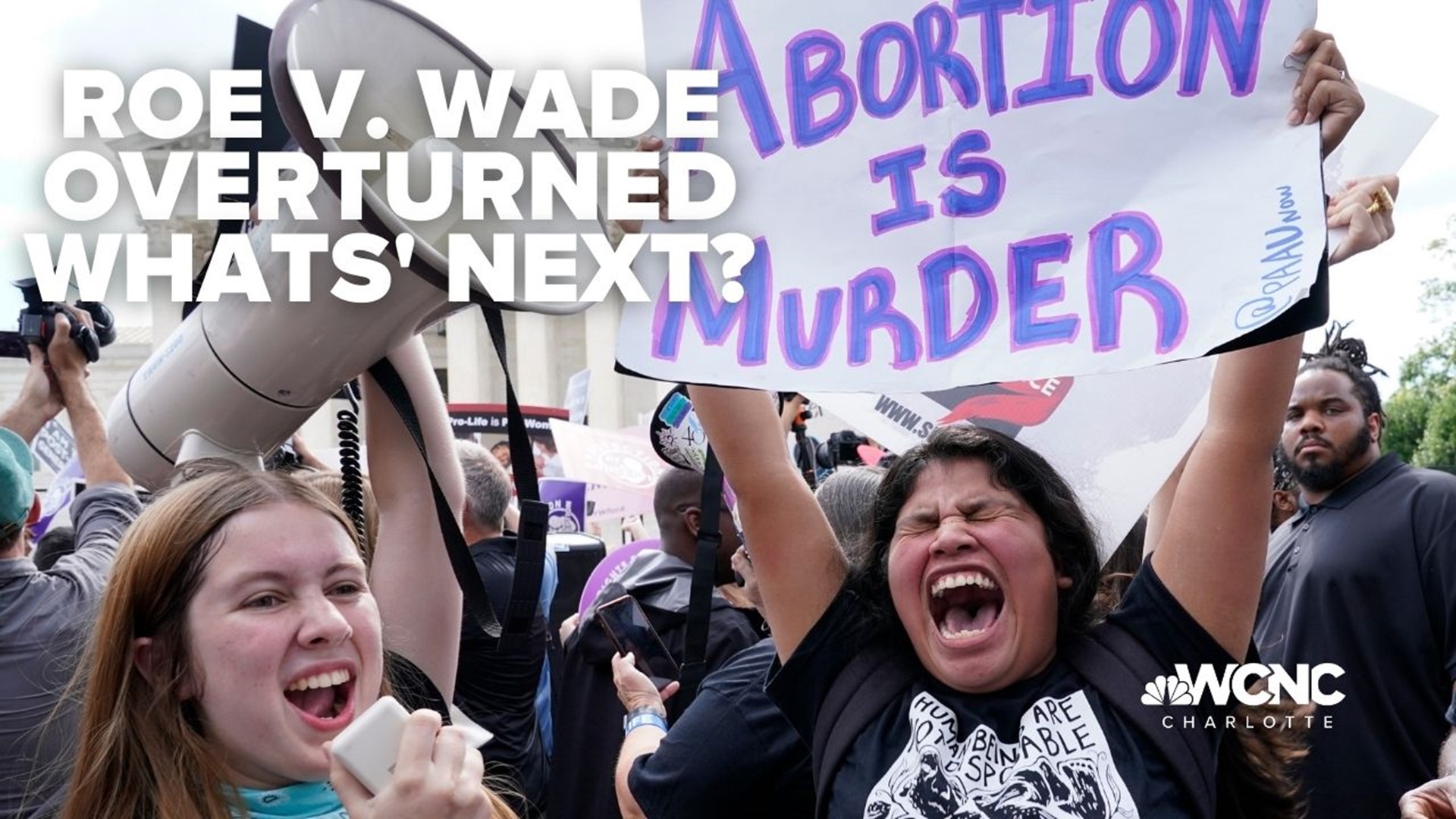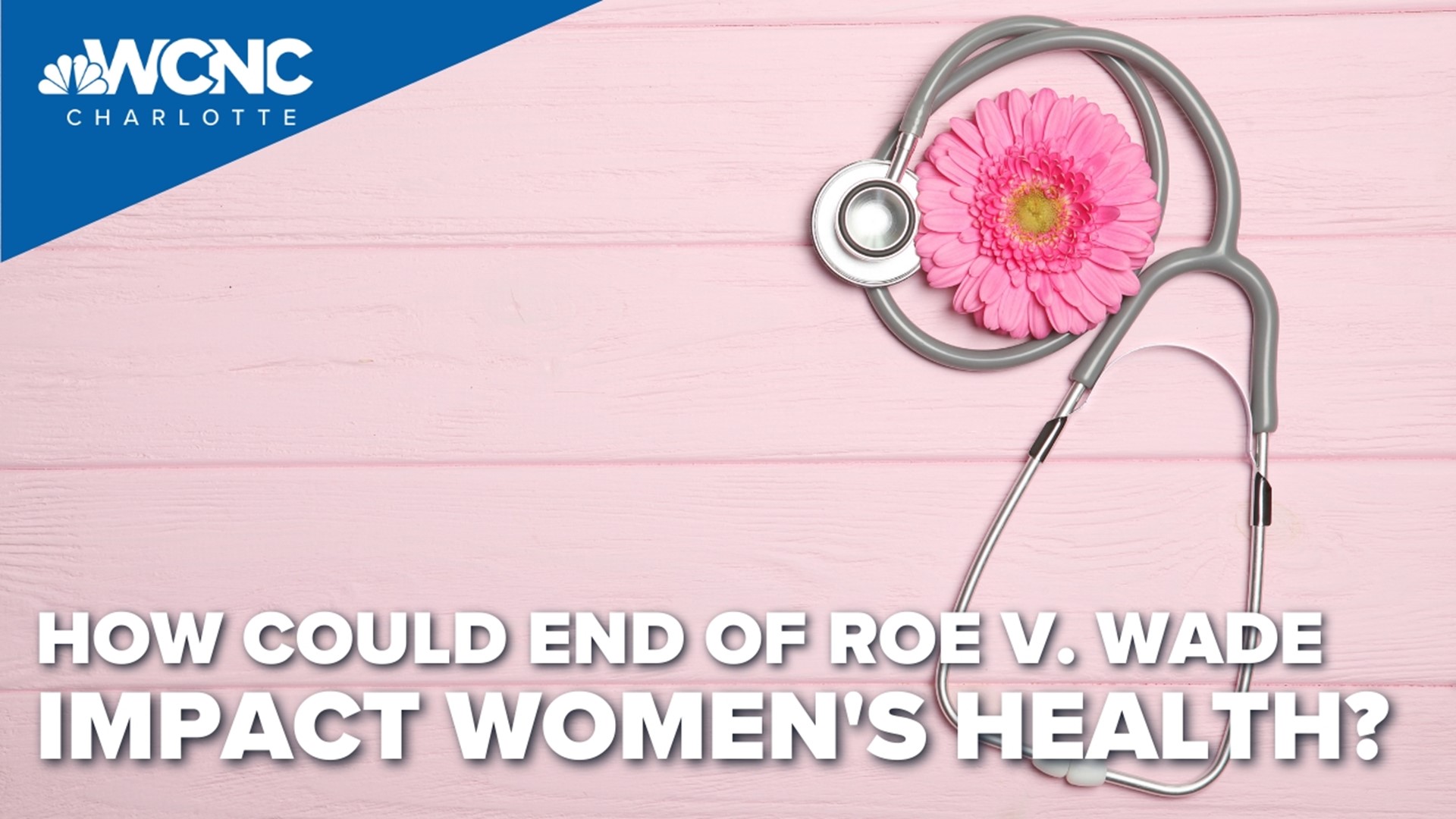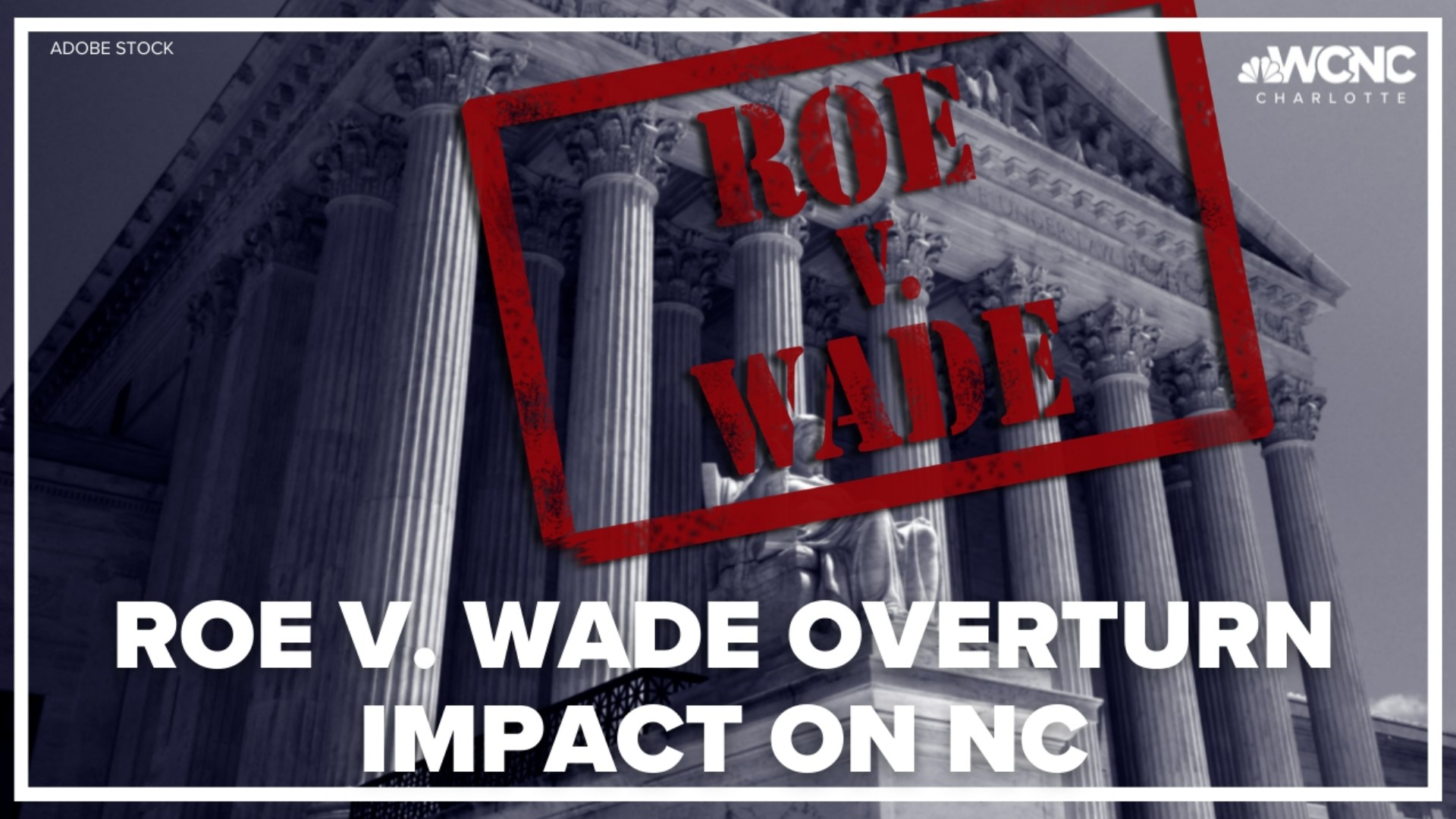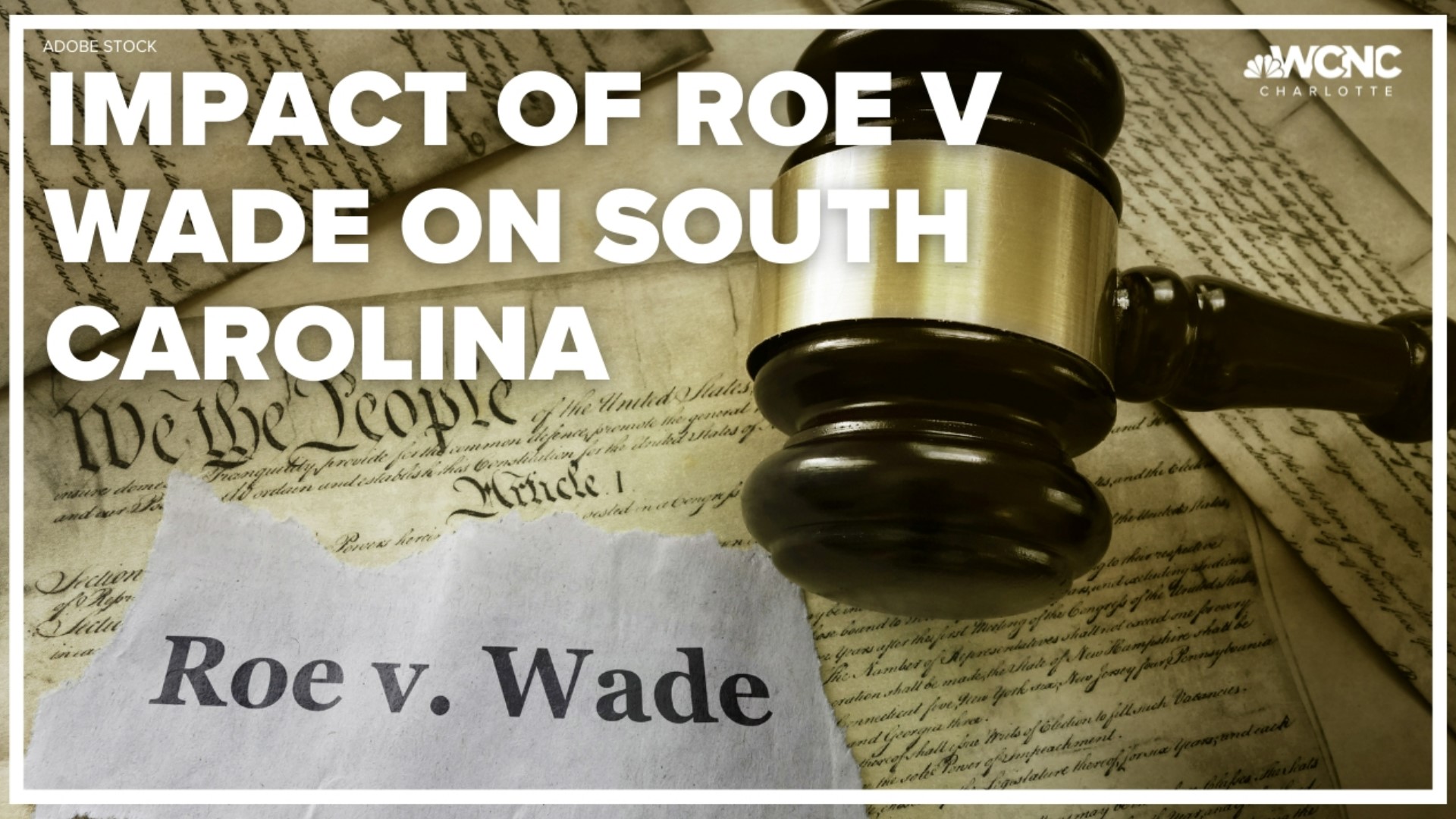CHARLOTTE, N.C. — The Supreme Court ruled to overturn Roe v. Wade Friday, the longtime legal precedent guaranteeing the right of legal abortion in the U.S. The landmark ruling now puts abortion into individual states' hands.
This prompts immediate questions across the country about what's next for abortion rights. So where do the Carolinas stand on the issue?
Trigger Laws
First, neither North Carolina nor South Carolina have so-called "trigger" laws regarding abortion.
When it comes to abortion, more than a dozen states have trigger laws that will immediately take effect and ban abortion following the Supreme Court's ruling on Roe v. Wade. Those states include neighboring Tennessee.

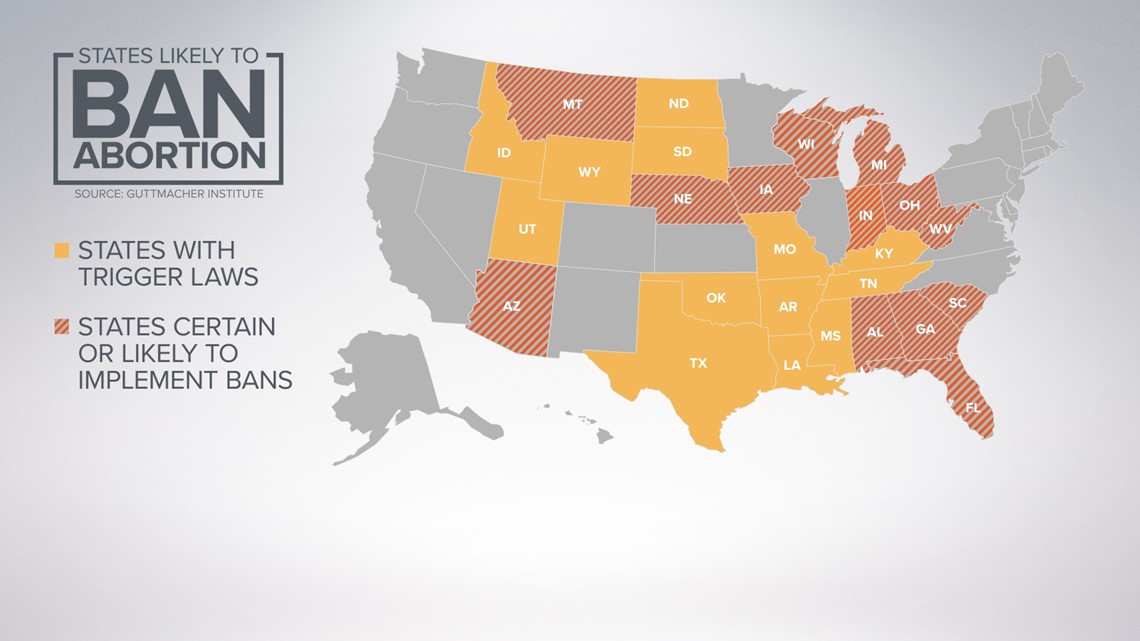
North Carolina abortion rights
Earlier this year, Gov. Roy Cooper, who is a Democrat, said he would veto any abortion restriction bill. This makes the idea a non-starter for House Speaker Tim Moore for now.
Cooper issued a statement saying he will "fight to keep politicians out of the doctor's exam room."
"For 50 years, women have relied on their constitutional right to make their own medical decisions, but today that right has been tragically ripped away. That means it's now up to the states to determine whether women get reproductive health care, and in North Carolina they still can.
I will continue to trust women to make their own medical decisions as we fight to keep politicians out of the doctor's exam room."
Attorney General Josh Stein tweeted Friday that North Carolina still has legal access to abortion following the Supreme Court's ruling.
"I have a message for the women of North Carolina: You still have a legal right to an abortion in our state," Stein tweeted. "North Carolina state law protects women's reproductive freedoms."
That likely won't change until at least November, when Republicans will have a chance to win a super majority in the General Assembly. A super majority would give Republicans the power to override Cooper's veto.
"It's difficult to win a super majority," Elon political science professor Jason Husser told WFMY. "Even if the Republicans do win a super majority, it would require a consensus within the Republican party to pass something."
Husser said it could be 2025 — when Cooper's term ends — before big changes are really possible. If the next governor is a Republican, it won't require a super majority to override a veto.
Bishop Peter Jugis of the Roman Catholic Diocese of Charlotte released the following statement:
"Today’s Supreme Court ruling means the lives of countless unborn children will be saved from abortion, and for that we are profoundly thankful. The Catholic Church has always professed that every human life is a gift from God and holds inestimable value, and even with this step forward, our work to protect the dignity of all human life, from conception to natural death, continues.
Today’s ruling also impels us to redouble our efforts to help women and couples facing unexpected or difficult pregnancies, and during their early years of parenthood. The Catholic Church is one of the largest providers of social services worldwide, and in western North Carolina, the Church has offered pregnancy support and adoption services for decades. The Diocese of Charlotte also partners with hundreds of agencies across our 46 counties who provide direct services to pregnant women and new mothers, from health care and housing, to food and transportation, to parenting classes and college tuition. More recently, I have asked our 92 churches to strengthen and expand these efforts, for example, by implementing the U.S. Conference of Catholic Bishops’ “Walking with Moms in Need” program to inventory local services and explore ways to fill gaps in services within their communities. Our goal has been – and always will be – to enable and equip every woman with the support and resources she needs to welcome and care for her unborn child.
Sadly, another likely result of today’s ruling is that the number of women traveling to North Carolina to seek abortion may rise, given that our state’s laws continue to legalize abortion. So, as we increase our outreach to these women, we must also intensify our advocacy for laws that will put an end to the practice of abortion. Ultimately, we as a society must finally recognize, as science confirms, that life begins at the moment of conception, and that this is really a civil rights issue involving the right to life for the most vulnerable among us, the unborn child.
I invite everyone to join me in praying for the conversion of hearts, so that our communities might come together to protect and support both mother and child at every stage of life."
South Carolina abortion rights
Last year, lawmakers passed the "fetal heartbeat bill" that almost completely outlaws abortion, but it was put on hold by the courts.
South Carolina currently allows abortions up to 20 weeks. With the overturning of Roe v. Wade, most abortions will become illegal in South Carolina.
The Fetal Heartbeat Act would limit abortions after a fetal heartbeat is detected around the six-week mark, with exceptions in cases of rape, incest, or a severe health risk.
It would also require the mother to view an ultrasound, hear the heartbeat, and receive information about the development of the fetus before obtaining an abortion.
The act was signed into law in 2021, but a lawsuit filed by Planned Parenthood kept it from being implemented. Now leaders are confident it will be.
"In South Carolina there is a fetal heartbeat bill that was passed a year ago that had a junction placed on it by a federal district court judge," University of South Carolina political science professor Kirk Randazzo told WLTX. "If Roe is overturned then that bill would immediately become the law of the state.”
The fetal heartbeat bill would prohibit abortion in most cases if a fetal heartbeat is detected, or at about six weeks — before most women know they're pregnant.
"It's effectively an outright abortion ban," Ann Warner with South Carolina's Women's Rights and Empowerment Network said. "Because six weeks is before most people know they are pregnant."
South Carolina Representative Tommy Pope said the Fetal Heartbeat Act was passed under Roe v. Wade, but with states now having more freedom, Pope said there is interest among leaders to restrict abortions even further.
“We did as much as we could under the law at the time. Now that the Supreme Court has spoken, there clearly would be opportunities to possibly do more," Pope said.
Gov. Henry McMaster, a Republican, celebrated the Supreme Court ruling by calling it a "resounding victory for those who have worked so many years to protect the lives of the most vulnerable among us." McMaster pledged South Carolina lawmakers will move to make abortion illegal through the fetal heartbeat bill by the end of the day on Friday, June 24.
"By the end of the day, we will file motions so that the Fetal Heartbeat Act will go into effect in South Carolina and immediately begin working with members of the General Assembly to determine the best solution for protecting the lives of unborn South Carolinians," McMaster said in a statement.
Protests in Charlotte
Several demonstrations took place nationwide Friday, with both anti-abortion and abortion rights advocates taking their opinions to the streets. The Queen City was no exception.
With the power now left to each state, people say they want their voices heard. Nearly everyone in the crowd outside of the Charlotte-Mecklenburg Government Center was advocating for abortion rights.
"It feels like such an attack on us personally," Tracey Lemmetti told WCNC Charlotte. "It feels like we don’t have a choice.”
But those who are anti-abortion are celebrating the decision, including Tori Shaw, the founder of Not Forgotten Ministries.
“I’m just thankful that lives will be saved from this ruling, and as a person who had an abortion and experienced the shame and guilt and lifetime of regret, I’m looking forward to a lot of women being saved from this," Shaw said.
Friday's action is just the start of what's to come. Many said they are now looking ahead to upcoming state elections to help play a part in the next move. Others said they felt called to act by donating to abortion funds.
"It is not the end," one protestor said. "We will continue to fight for a better future with personal freedoms and bodily autonomy not just for pregnant people but for everyone."
The history behind the ruling
March 1970
Two attorneys filed a lawsuit in U.S. federal court on behalf of Norma McCorvey, a Texas resident, who wanted to terminate her pregnancy. The filing was "Jane Roe v. Wade", and it argued that Texas' abortion statutes were unconstitutional and violated McCorvey's privacy under five Constitutional amendments.
In January 1973
A 7-2 Supreme Court decision in favor of "Jane Roe," ruled that the Constitution protects the right to an abortion. The all-male justices found abortion was a "fundamental" right for a woman's "life and future."
September 1976
The Hyde Amendment passed. This was a restrictive measure prohibiting government funds to be spent on abortions except in the case of rape, incest or a threat of life to the woman.
1988 and 1989
Lawmakers in Pennsylvania amended the state's Abortion Control Act and added five provisions, including informed consent before an abortion, a 24-hour waiting period, consent of one parent for a minor to have the procedure, and a husband notification requirement for married women.
June 1992
With Planned Parenthood of Southeastern Pennsylvania v. Casey, the Supreme Court's 5-4 decision upheld three of the provisions. The court did invalidate the husband notification requirement.
November 2003
President George W. Bush signed into law the Partial-Birth Abortion Ban Act. This prohibited doctors from performing late-term abortions.
April 2007
The Supreme Court upheld the federal ban on late-term abortions, ruling 5-4 in the Gonzales v. Carhart case, finding that it was not unconstitutionally vague and did not impose an undue burden on the right to an abortion.
July 2013
Texas lawmakers enacted House Bill 2, with provisions that included requiring doctors performing abortions to have hospital admitting privileges no more than 30 miles from the abortion facility. Abortion providers in Texas challenged the requirements, arguing that they violated the 14th Amendment under Casey. This challenge ultimately ended up before the Supreme Court and was struck down in June 2016.
June 2016
The Texas admitting-privileges and surgical center requirements law is struck down by the Supreme Court in a 5-3 ruling.
May 2021
The high court agreed to hear Dobbs v. Jackson Women's Health Organization case, the Mississippi law that bans abortions after 15 weeks of pregnancy. Later, Mississippi state officials would ask the Supreme Court to overturn Roe and Casey.
September 2021
Texas enacts Senate Bill 8 or the Heartbeat Act -- the first time a state successfully imposed a six-week abortion ban since Roe v. Wade. The act also gave members of the public, versus state officials, the right to sue anyone who performs or helps facilitate an illegal abortion.

